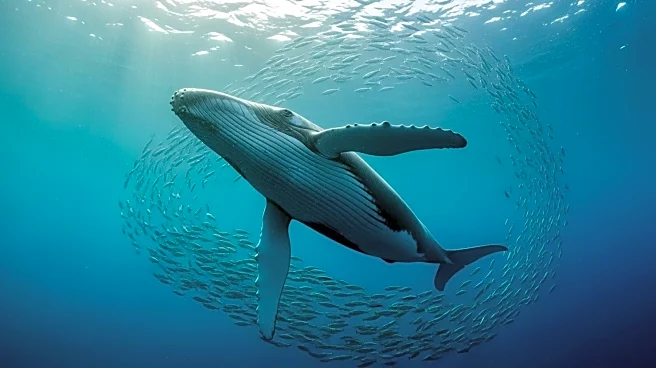What's Happening?
Marine scientists in Australia have captured rare footage of remora fish, also known as sucker fish, engaging in a unique behavior known as whale-surfing. These fish were observed detaching from humpback
whales just before the whales breached the surface, only to reattach themselves moments later. The footage was obtained using suction-cup cameras placed on the whales during their annual migration from Antarctica to Queensland. The remoras, which live upside-down and feed on dead skin flakes, use an adhesive plate on their heads to create a vacuum seal, allowing them to hitch a ride on the whales. This behavior was documented by Olaf Meynecke from Griffith University, who noted the precision and timing of the remoras as they responded to the whales' movements.
Why It's Important?
The discovery of remoras' whale-surfing behavior provides new insights into the symbiotic relationship between these fish and their whale hosts. While remoras are harmless to the whales, feeding on dead skin and sea lice, the footage suggests that whales may find them annoying, as evidenced by their frequent breaching. Understanding this interaction is crucial for marine biologists studying whale behavior and migration patterns. Additionally, the footage highlights the complexity of marine ecosystems and the intricate relationships between different species. This research could inform conservation efforts and strategies to protect marine life, particularly in regions like Australia's humpback highway, a key migratory corridor.
What's Next?
Further research is needed to understand the full extent of the remoras' journey with the whales, including how long they remain attached and where they go when they detach. Scientists are interested in whether remoras find other hosts during the whales' absence, such as manta rays or dolphins. This ongoing study could reveal more about the lifecycle of remoras and their adaptability in marine environments. Additionally, the footage may lead to more detailed studies on the impact of remoras on whale behavior and health, potentially influencing marine conservation policies.
Beyond the Headlines
The footage of remoras whale-surfing raises questions about the ethical implications of human interaction with marine life. The use of suction-cup cameras, while non-invasive, highlights the balance researchers must maintain between studying wildlife and preserving their natural behaviors. This research also underscores the importance of technological advancements in marine biology, allowing scientists to capture and analyze behaviors that were previously difficult to observe. As marine ecosystems face increasing threats from climate change and human activity, such studies are vital for developing effective conservation strategies.











